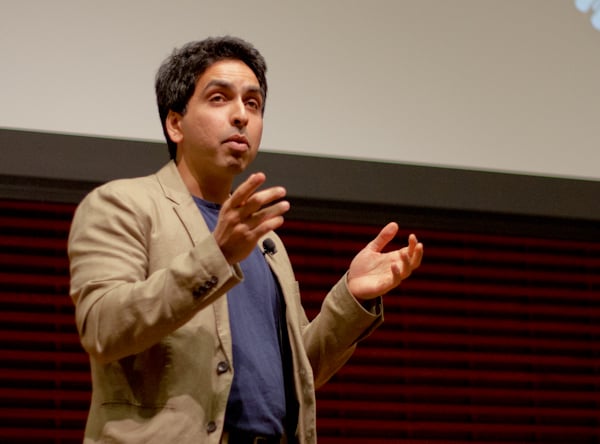Salman “Sal” Khan, founder and CEO of the nonprofit education organization Khan Academy, was greeted by a sea of raised hands during a December event held at CEMEX Auditorium.
Khan opened the discussion by asking the audience who had used the platform before, prompting raised hands from a majority of the crowd and enthusiastic cheering by the almost 500 people attending his fireside chat. The event was hosted by the California Policy Forum, a project of the California Policy Collective that focuses on education technology, policy and social impact.
Khan Academy offers free learning resources in subjects related to math, science and the humanities. The service has amassed 160 million registered users since its founding in 2008 and partners with “more than 500 public school districts and schools across the country.” Its website provides video lessons and mastery learning features to its users.
During the event, Khan spoke about what drove him to create Khan Academy — a turn of events inspired by tutoring his cousins while working as a hedge fund analyst in the early 2000s, he said.
“I started writing software for my cousins and that was fun for me. To write a little thing that could generate exercises for them… that was cool,” Khan said. “My cousins were using it and finding value. I called it Khan Academy,” Khan said.
He said Khan Academy had a steady growth, starting out as a family enterprise where he posted video tutorials on YouTube due to the amount of interest in his lessons. Eventually, he quit his day job to sustain the effort required for the organization’s success, he said.
“Any time you do anything entrepreneurial, you really have to start with delusional optimism,” Khan said.
This optimism was first financially sustained by Khan’s savings, an unexpected donation from Ann Doerr, the now-chair of Khan Academy and in 2010, grants from Google and the Bill and Melinda Gates Foundation. With this funding, he expanded his organization, prioritizing personalization in the learning tools, Khan said. He said he understood that many kids were disengaged in class because of the teaching methods employed and limited resources — not just the absence of motivation.
Khan is most proud of the organization’s adherence to its goal of education accessibility, which he said was missing from many Silicon Valley nonprofits and startups.
“I knew that you’re not going to be able to give a free world-class education for anyone, anywhere overnight,” Khan said. “This is a long game.”
Khan expressed optimism about the use of artificial intelligence in education, despite widespread concerns about academic dishonesty and cheating that have prompted school districts to ban AI use.
AI “really could not just look like, but actually do pedagogical things. You can talk to literary characters or simulations … and [teachers] can save time in terms of grading papers, writing progress reports,” Khan said. “It’s going to transform the nature of assessment.”
These new assistive AI technologies are at the forefront of Khan Academy’s newest project, Khanmigo. Described as an AI guide, Khanmigo is a teaching assistant launched in March and designed to help teachers and parents monitor students’ progress and develop tailored lessons for learning.
Khan said within the few months that Khanmigo has been implemented, “about 50,000 students, teachers and school districts around the country” are using the system in their day-to-day learning. Khanmigo requires users to pay the fee needed to utilize the OpenAI generative system GPT-4, creating costs that don’t typically come with Khan Academy’s learning resources.
“You very quickly realize that, yeah, [AI] can do a lot, but if you really want it to be a magical experience and feel personable … there are a lot of layers you have to add on it,” Khan said.
Khan said he’s confident that Khan Academy’s belief in “a free, world-class education for anyone,” will be propelled by various technological tools.
“If more people feel educated and empowered, they have pathways to feeling like they matter,” Khan said.
